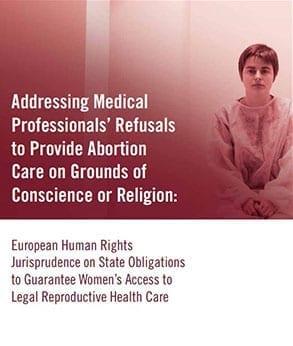Outcome of Irish Referendum on Abortion is a Momentous Result for Reproductive Rights
(GENEVA) The Center for Reproductive Rights celebrates today’s referendum result in favour of repeal of the Irish constitutional prohibition on abortion as a deeply historic moment for women’s reproductive health and rights in Ireland and globally.
The Irish people voted by a resounding majority to remove the constitutional prohibition and enable Irish lawmakers to legislate on abortion and bring about long-awaited reforms.
As a result of the referendum, Irish lawmakers can now reform Irish legislation on abortion and bring it into line with that of most other European countries. The result will also enable Ireland’s compliance with the rulings of the United Nations Human Rights Committee in the ground-breaking Mellet v. Ireland (2016) and Whelan v. Ireland (2017) cases, brought by the Center for Reproductive Rights on behalf of Amanda Mellet and Siobhán Whelan.
Said Leah Hoctor, Regional Director for Europe at the Center for Reproductive Rights:
“Today’s result marks an immensely historic moment for the women of Ireland. Irish laws on abortion have been among the most restrictive in the world and wholly out of step with legislation in almost every other European country. Now the Irish people have affirmed that women must be able to access safe abortion care in their home jurisdiction under the care of their own health professionals.”
“The referendum result is also a landmark milestone in the global trajectory towards respect for women’s reproductive rights and the eradication of restrictive laws on abortion that harm women’s health and violate their human rights.”
“Through their compassionate vote in favour of women’s access to reproductive health care, the Irish people have provided women across the world with cause for inspiration and hope.”
“The immense impact of this result will reverberate globally for years to come. Women living in countries with highly restrictive abortion laws can today draw renewed comfort and encouragement that law reform is possible and that significant change to safeguard women’s health and rights can be achieved.”
“In its response to the Human Rights Committee in follow-up to the Mellet and Whelan decisions the Irish government repeatedly outlined that constitutional change was a necessary first step in order to enable legislative change. Today’s referendum result has cleared the way for meaningful law reform.”
###
About the Center’s work in Ireland:
The 8th Amendment of the Irish Constitution was introduced into the Irish Constitution in 1983. It prohibited abortion in Ireland in all circumstances except where a woman’s life was at ‘real and substantial risk.’ As a result, Irish laws on abortion have been among the most restrictive in the world and wholly out of step with legislation in almost every other European country.
In 2013 and 2014 respectively the Center for Reproductive Rights filed cases on behalf of two women in Ireland, Amanda Mellet and Siobhán Whelan, before the United Nations Human Rights Committee, claiming that as a result of Ireland’s prohibition on abortion both women were subjected to multiple violations of their rights under the International Covenant on Civil and Political Rights, a binding international treaty ratified by Ireland.
In its decisions on both cases, the Human Rights Committee held that Ireland had subjected each woman to cruel and inhuman treatment as a result of its legal prohibition on abortion and had violated their rights to privacy and equality before the law. In both decisions, the Committee ruled that Ireland was obliged to provide each woman with compensation and psychological support services and to reform its law on abortion.
Following the decisions, the Irish Government paid compensation to both Ms. Mellet and Ms. Whelan and agreed to cover the costs of any psychological support or counselling services they might access. This was the first time that the Irish state provided compensation to women who had travelled for abortion care that was illegal in Ireland.
The Committee’s rulings represented the first unequivocal condemnation by an international legal authority, in response to an individual complaint, of Ireland’s prohibition and criminalization of abortion. They were cited in the report of the Joint Oireachtas Committee on the 8th Amendment as one of three critical reason why constitutional reform on abortion was necessary.

